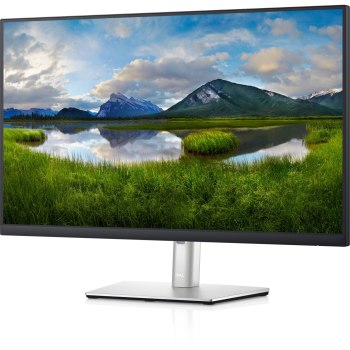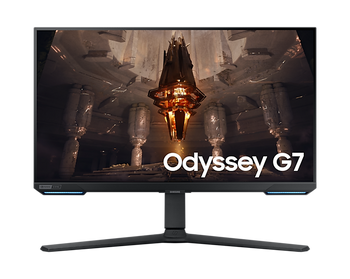- High color accuracy
- Multiple connectivity options
- HDR support
- Eye comfort features
- High refresh rate
- Curved immersive design
- Vibrant color reproduction
- G-SYNC and FreeSync support
- Higher price point
- No built-in speakers
- VA panel may have slower response times than IPS
- Expensive
Dell UltraSharp U2720Q vs Samsung Odyssey G7
When it comes to high-performance displays, two notable options stand out from the rest: the Dell UltraSharp U2720Q and the Samsung Odyssey G7. Both of these cutting-edge monitors boast impressive features that cater to different user needs, whether you're a professional graphic designer or an avid gamer. In this comparison, we'll delve into the key similarities and differences between these two top-tier displays, highlighting their unique strengths and weaknesses.
Firstly, both the Dell UltraSharp U2720Q and the Samsung Odyssey G7 are classified as thin bezel monitors, meaning they feature a sleek and minimalistic design with narrow borders around the screen. This design aesthetic not only adds to their visual appeal but also provides an immersive viewing experience by minimizing distractions. The Dell UltraSharp U2720Q has a 27-inch IPS panel with a resolution of 3840 x 2160 (4K), offering vibrant colors and excellent color accuracy. On the other hand, the Samsung Odyssey G7 features a 27-inch or 32-inch VA panel with a resolution of 2560 x 1440 (QHD) and a faster refresh rate of up to 240Hz.
One of the primary differences between these two monitors lies in their intended use cases. The Dell UltraSharp U2720Q is geared towards professionals who require accurate color representation, such as graphic designers, photographers, and videographers. It boasts an impressive color gamut, covering 99% of the sRGB spectrum and 95% of the DCI-P3 spectrum, making it ideal for tasks that demand precise color accuracy. Additionally, it features a wide range of connectivity options, including USB-C with Power Delivery, HDMI, DisplayPort, and Ethernet.
In contrast, the Samsung Odyssey G7 is designed specifically with gamers in mind. Its high refresh rate and fast response time make it perfect for fast-paced games that require quick reflexes. The monitor also features NVIDIA G-Sync and AMD FreeSync technology to reduce screen tearing and provide a smoother gaming experience. Furthermore, the Odyssey G7 has a curved design, which enhances immersion and provides a more engaging viewing experience.
Another key difference between these two monitors is their brightness and contrast ratios. The Samsung Odyssey G7 has a higher peak brightness of up to 600 nits, making it more suitable for use in bright environments. It also features a higher contrast ratio, thanks to its VA panel, which provides deeper blacks and more vibrant colors. On the other hand, the Dell UltraSharp U2720Q has a lower peak brightness of around 350 nits, but its IPS panel still manages to deliver excellent color accuracy and a wide viewing angle.
In terms of ergonomics, both monitors offer adjustable stands with tilt, swivel, and height adjustment options. However, the Samsung Odyssey G7 also features a more extensive range of motion, allowing users to adjust the monitor's position to their preferred viewing angle. The Dell UltraSharp U2720Q, on the other hand, has a more compact design and is easier to mount on a wall or attach to a VESA-compatible arm.
In conclusion, both the Dell UltraSharp U2720Q and the Samsung Odyssey G7 are exceptional thin bezel monitors that cater to different user needs. While the Dell UltraSharp U2720Q excels in terms of color accuracy and professional-grade features, the Samsung Odyssey G7 is designed specifically for gaming enthusiasts who require fast response times and high refresh rates. Ultimately, the choice between these two monitors depends on your specific requirements and preferences. If you're a professional looking for accurate color representation, the Dell UltraSharp U2720Q may be the better option. However, if you're an avid gamer seeking an immersive and responsive gaming experience, the Samsung Odyssey G7 is certainly worth considering.































